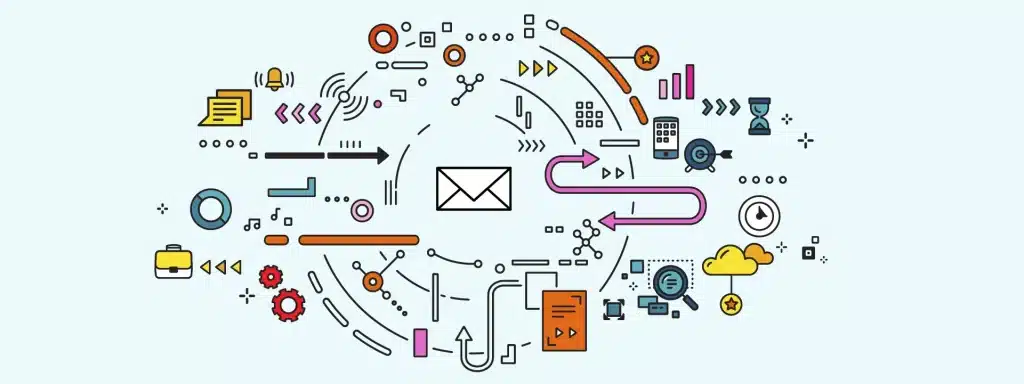Managing digital clutter has become essential in today’s hyper-connected world. From overwhelming email inboxes to chaotic cloud storage, digital disorganization can significantly reduce productivity and increase stress. This guide outlines clear, actionable strategies to organize your online life and tackle the burden of online overload.

Why Managing Digital Clutter Matters
Digital mess isn’t just inconvenient; it affects your mental clarity, workflow, and even sleep. According to the American Psychological Association (APA, 2021), mental clutter—whether digital or physical—leads to increased stress and cognitive fatigue (APA 2021).
Additionally, a McKinsey Global Institute study found that workers spend around 28% of their workweek just managing emails (McKinsey, 2023). Clearly, the effects of unmanaged online spaces are more serious than they seem.
How to Know If You Have a Digital Clutter Problem
Signs you may be overwhelmed by digital clutter include:
- Thousands of unread emails.
- Difficulty locating important documents quickly.
- Smartphone screens loaded with unused apps.
- Anxiety triggered by notifications or device use.
- Multiple duplicate files across devices.
Recognizing these warning signs is the first step toward regaining digital order.
Practical Tips for Managing Online Overload
1. Clear Your Email Inbox
- Unsubscribe from newsletters and spam you don’t need.
- Set rules and filters for important contacts.
- Archive or delete old messages past six months.
Tip: Services like Clean Email and Unroll.Me can automate inbox management (PCMag, 2024).
2. Organize Your Files Smartly
- Build a simple folder hierarchy: “Personal,” “Work,” “Financial,” etc.
- Rename files clearly with descriptive names.
- Use tools like Duplicate Cleaner to remove redundant files.
Creating a system once saves hours of frustration later.
3. Audit Your Apps and Notifications
- Delete apps you haven’t used in three months.
- Turn off non-essential notifications.
- Group necessary apps into meaningful folders.
Fact: According to Harvard Business Review, decluttering your apps can significantly lower anxiety (HBR, 2023).
4. Improve Your Browser Setup
- Regularly close tabs and clear browsing history.
- Bookmark only essential sites.
- Use tab managers like OneTab for better organization.
Small changes here make daily browsing faster and cleaner.
5. Set Monthly “Digital Declutter Days”
Consistency is key to preventing a digital pile-up:
- Set a monthly reminder for 30-minute decluttering sessions.
- Tidy up emails, files, apps, and photos in one sitting.
- Celebrate after each session to reinforce the habit.
This practice will maintain your digital health with minimal effort.
The Benefits of Managing Digital Overload
Taking time to manage your online space has lasting impacts:
- Improved focus and work output.
- Lowered stress and better mood.
- Faster device speeds.
- Reduced cloud storage costs.
- Better security against cyber threats.
Stanford University research indicates that digital decluttering can boost emotional well-being by 23% in just six weeks (Stanford, 2022).
Conclusion: Make Managing Digital Clutter Part of Your Life
Tackling online mess isn’t about achieving perfection—it’s about making your digital life support your goals instead of sabotaging them. Managing digital clutter helps you stay organized, stress-free, and more productive in every aspect of your life. Start today by implementing small changes that build into lasting digital peace.
References
- American Psychological Association (2021) Stress in America™ 2021: The State of Our Nation. Available at: https://www.apa.org/news/press/releases/stress/2021/report (Accessed: 28 April 2025).
- McKinsey Global Institute (2023) The Social Economy: Unlocking Value and Productivity through Social Technologies. Available at: https://www.mckinsey.com/industries/technology-media-and-telecommunications/our-insights/the-social-economy (Accessed: 28 April 2025).
- Harvard Business Review (2023) How to Reduce Anxiety by Organizing Your Digital Life. Available at: https://hbr.org/2023/09/how-to-reduce-anxiety-by-organizing-your-digital-life (Accessed: 28 April 2025).
- Stanford University (2022) The Psychological Impact of Digital Clutter. Available at: https://news.stanford.edu/releases/2022/06/digital-declutter-wellbeing/ (Accessed: 28 April 2025).
- PCMag (2024) The Best Tools for Managing Your Inbox. Available at: https://www.pcmag.com/picks/the-best-tools-for-managing-your-inbox (Accessed: 28 April 2025).









